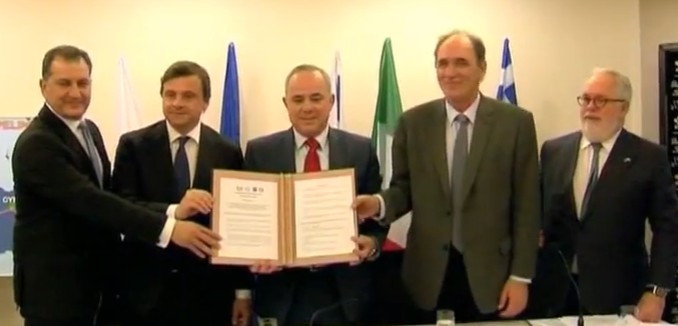The world’s longest underwater gas pipeline, which would connect Israel to Europe, is set to be operational by 2025, Israeli and European officials announced on Monday.
“The unprecedented $6 billion-$7 billion plan in question involves building a privately-funded, 2,200-km deep-sea pipeline linking Israeli and Cypriot gas to the Greek and Italian shores,” The Jerusalem Post reported.
“This is the beginning of our wonderful friendship between four Mediterranean countries – Israel, Cyprus, Greece, and Italy,” said Israel’s National Infrastructure, Energy, and Water Minister Yuval Steinitz.
“Cyprus and Israel are very reliable suppliers. We highly value gas supply from the region as a vital source of our gas supply that can make a valuable contribution to our strategy to diversify sources, routes and suppliers,” European Commissioner for Climate Action and Energy Miguel Arias Cañete said. “This is a pipe that unites and will have the full support of all the members of the European Union.”
The move, if implemented, would reduce European dependence on Russian energy. “We think this project in the next decades can be a real pillar of our energy strategies,” Italian Economic Development Minister Carlo Calenda said. “Now we need to speed up the project to realize it.”
Due to the discovery of Israel’s Leviathan and Tamar gas fields, Israel has become an exporter of natural gas. It was reported last month that Israel had begun shipping gas to Jordan in January.
In the past year, Israel, Cyprus, and Greece have developed closer ties, including with regard to developing the Mediterranean gas fields. The three nations also agreed late last year to form a regional emergency response force to deal with natural disasters and other crises. The idea for the regional force stemmed from the help extended to Israel by Greece and Cyprus (among other nations) during wildfires that swept the country in late November.
The emerging alliance between Israel, Greece, and Cyprus is significant because “up until the early 2000’s Greece and Cyprus were among the most critical countries toward Israel in Europe,” the Post‘s diplomatic correspondent Herb Keinon explained in December. Relations improved after the discovery of the natural gas fields, as well as in reaction to Israeli diplomatic tensions with Turkey, a rival to the two other countries.
Israel has in recent years largely restored its ties with Turkey, and returned an ambassador to Ankara in December 2016 after a six-year absence.
[Photo: Jposttv / YouTube ]




